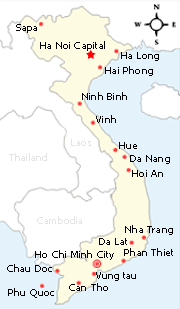|
Tourist waste pollutes seas, rivers Although a booming tourism industry has turned Viet Nam into one of the hottest destinations in all of Asia, rampant waste by the same industry is destroying the country’s charming coasts and waterways.
According to the Nha Trang Bay Reserve, every day, nearly 10 tonnes of waste water are let into the sea by tourism facilities and locals in Nha Trang City.
Statistics from the Ba Ria-Vung Tau Tourism Department showed that only 300cu.m of more than 1,600cu.m of waste water discarded from hotels and resorts were treated each day. As forecast by the department, the amount of nitrogen discarded into the sea from waste water will be between 26 and 52 tonnes per day by the year 2020. Research done by the HCM City Institute for Environmental and Natural Resources showed that sea pollution in tourist areas had become more serious in recent years. The level of Total Suspended Solid (TSS) content in beaches like Do Son, Hai Phong, Binh Dinh, Quy Nhon and Vung Tau was normally two to four times higher than the country’s standard level of 25g per cubic metre. The head of the Institute for Environmental and Natural Resources, Nguyen Van Phuoc, said that construction projects in tourist areas were messy and destroying nearby ocean ecosystems. Negligence in regards to waste water treatment in tourist areas had resulted in higher levels of organic pollution in the country’s coastal areas, while fishing and souvenir hunting were also harming underwater environments. The research showed that a lack of awareness on environment protection had made the situation much worse. Along the beaches of Binh Dinh, Nha Trang and Ba Ria-Vung Tau, waste water from urban and tourist areas was being discarded into the sea without any treatment. A report, the Economic Impacts of Sanitation in Viet Nam 2008 by the World Bank, said that about 8.8 per cent of the nation’s total economic costs was a direct result of tourism, with an absolute value of US$69 million. VNAT was now building a framework for a national action programme for the tourism industry. The programme will aim to communicate with hotel and resort owners to raise their awareness of sustainable development. The Department of Hotels under VNAT was now working with the Ministry of Natural Resources and Environment to build up one set of criteria, giving specific instructions on how to effectively manage energy, water and waste treatments. The director of the Hotel Department, Nguyen Phuong Anh, said, "It’s not easy to make everyone comply with these standards, as some environmental-friendly facilities will require large investments." The department will first focus on education to raise awareness among hotel and resort owners, and then gradually create a set of requirements for all newly-established companies. With support from the Energy Conservation Research and Development Centre and the French Environment and Energy Management Agency, the department was working on the Eco-label Programme in the hotel sector and across ISO 14000, on environmental management standards, to help organisations minimise their operations’ negative effect on the environment. "This professional working environment in hotels will effect suppliers, who will in turn also have to prove themselves as friendly to the environment." The department also helps hotels and resorts promote their own images overseas by nominating their models at international competitions on tourism and environmental programmes. "Overseas tourists, especially from European countries, are very picky and tend to choose environmentally-friendly services," said Anh. According to Anh, the Committee for Standards Reviews will soon be set up, after the department finishes working on a set of environmentally friendly criteria and labelling satisfied units. Recognising the vital role tourism was playing in saving the environment, businesses have begun their own programmes. The Sai Gon Tourist Company, for example, now uses recycled products in their 15 member hotels. The Victoria Chau Doc Company launched their own Green Logo Programme, which co-operates with local authorities and students to clean up surrounding areas each quarter. "This is an investment in the future. Viet Nam attracts tourists with its wild and beautiful landscapes, but we won’t be able to survive in the long term if the environment is destroyed," said Trinh Quang Man, Director of the Victoria Chau Doc Company. VietNamNet/Viet Nam News Other news for Wednesday 12 August, 2009
View all news for Wednesday 12 August, 2009 on one page News for Tuesday 11 August, 2009
View all news for Tuesday 11 August, 2009 on one page Recent News
|










